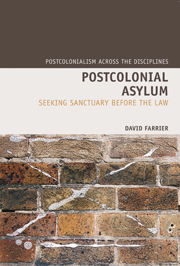2 - Horizons of Perception
Summary
By directing our gaze we also avert our eyes.
Tara Polzer and Laura HammondIn/visible relations
Through the Wire, Pip Starr's documentary of the 2002 protests at Woomera IRPC, vividly describes how visibility is framed by the camp dispositif. During the protests, demonstrators ruptured the perimeter fence and mingled with the detainees – a moment that, for Suvendrini Perera, embodied a form of political communitas where ‘[e]veryone is, joyously, un-Australian’.Starr's documentary emphasizes, however, a more contingent understanding of how (citizen) demonstrator and (non-citizen) detainee appear to one another in the camp dispositif. Starr employs what I would call striated framing, frequently foregrounding the metal and chain-link fences that surround the camp, which, contra Perera's syncretic community, draws attention to the exclusionary forces that shape the dispositif.
The documentary is accompanied by the voiceover of an anonymous asylum seeker explaining why he claimed asylum in Australia:
In such a dictator government [sic], like Iranian government, you have to believe what they believe. You have to believe what Ayatollah believes. I don't – I believe what I believe. In Iran protest is illegal – you disappear or they kill you, and no-one knows what has happened to you.
As this point the camera zooms in on a chain-link fence in the foreground, which is divided into adjacent subsections, beyond which the demonstrators are seen approaching the compound where the detainees are penned by a steel fence.
- Type
- Chapter
- Information
- Postcolonial AsylumSeeking Sanctuary Before the Law, pp. 57 - 91Publisher: Liverpool University PressPrint publication year: 2011

